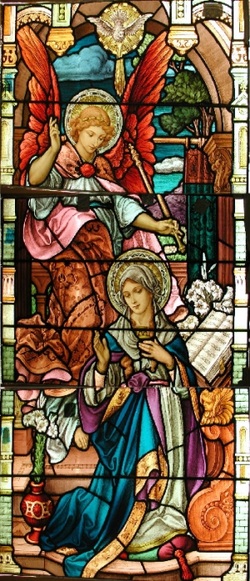
Let us think of it for a little time together. For on the 25th of March, we keep the Feast of the Annunciation, and it is well to be with the Church in our thoughts. We will try to reconstruct the scene. St. Ignatius, when he meditated, divided his subject into places, persons, and words. This division is good for serious study of any kind. We will therefore order our thoughts in some such wise. The scene is a little room in the village of Nazareth. The village is situated on the slope of a hill, on a range due west of the Sea of Galilee. The Nazarenes had a bad reputation, they were ignorant: poor, and vicious. "Can anything good come from Nazareth?" the cautious Nathaniel asked. "Come and see," Phillip answered. And we will come too. The persons are St. Gabriel and the Virgin espoused to a man called Joseph. The Archangel described himself to Zachary as "one of the seven who stand before the throne." There is deep significance in these words. "One of the seven" - impersonal, but distinguished - seven only. "Who stand"— ready to do the will of God; "before the Throne"— denoting the majesty of the service. Then we listen to the words of the salutation:
"Hail, full of grace !" Gabriel had just come from the presence of God, yet he was struck with the beauty of Mary's soul. And he tells her so. All great minds praise easily; it is the little of soul that grudge praise. "The Lord is with thee." This is a scriptural phrase used on sublime occasions— to Moses before starting on his perilous journey to Pharaoh's court; to Jeremias when "his soul was an adamant"; to the Apostles by Our Lord Himself, when about to leave them alone upon earth ; by the Church in her solemn rites. But of all the sublime occasions this was the most sublime.
"The Lord is with thee, thou blessed among women." And now we must look at her, this Blessed among women, the Lily of Israel. How beautiful painters have made her in their pictures. Their thoughts about her must have been beautiful. Her purity, her spotlessness of soul, her modesty of exterior, her deep humility seem to have taken hold of their imagination and have wrought themselves out upon their canvas. '
"She had found grace with God," the angel told her, and she had found favor with men. There never was a queen so reverenced, never a mother so loved, never a virgin so imitated. She has the faithful of the world at her feet. And greater still, she has the fallen, the crushed, the outcast. "Nature's solitaiy boast," the sinless one, seems to hold out hope to those who have forfeited seemingly every claim to hope.
Mary's soul was full of grace, the angel said. Not that it had attained the measure of its sanctity, but that she was perfect as a child could be. As Mother of God she would rise immeasurably higher. When Gabriel gave his message of praise Mary was startled and wondered what kind of salutation this might be. But the angel comforted her: "Fear not, Mary, for thou hast found grace with God. Be hold thou shalt conceive in tby womb, and thou shalt bring forth a son; and thou shalt call His name Jesus. He shall be great and shall be called the son of the Most High; and the Lord shall give unto him the throne of his father David; and he shall reign in the house of Jacob for ever. And of his kingdom there shall be no end. Mary pondered: Jesus, Savior; David's son; King of the house of David, reigning forever. Then she was to be the Mother of the Messiah, the Mother of God. But she is a virgin. How can this be? she asks. The angel explains the mystery. "The Holy Ghost shall come upon thee, and the power of the Most High shall overshadow thee. And therefore the Holy which shall be born of thee shall be called the Son of God. '
The Holy Ghost, the Son of God, all three Persons of the Blessed Trinity working in Mary's soul. She answered: "Behold the handmaid of the Lord; be it done unto me according to thy word." A moment at midnight, a maiden's consent, and the work of redemption began-- "And the Word was made Flesh."
The Church appoints many weeks of joy at Christmas in honor of Our Savior's birth; many weeks of sorrow in Lent in honor of His sacred Passion; many weeks of gladness at Easter in honor of His glorious Resurrection. But running through all this joy and sorrow and gladness is the daily triple homage paid to the Incarnation. When the sun rises, when it sets, when it is on the meridian, the bell rings out the "Angelus," and at the sacred words "the Word was made Flesh"every Catholic within hearing renders homage to God and the Son made Man for men. Eternity is the ever-present. Great truths do not happen there and become forgotten. So the eternal Church of God keeps for ever before her children this most wonderful of mysteries, and there rises up from earth to Heaven an everlasting praise in honor of the Son of God. We are Catholics. Shall we be dumb when the bell praises God? Shall we let the convent children and the peasantry of Catholic countries have all the praise to themselves? Or shall we in our own country be to ourselves reminders, and in default of a bell sing in our hearts the Angelus' triple praise? The "Angelus" well said three times a day would go far to the making of saints.
Source: Manual of the Holy Catholic Church, Imprimatur 1906
| lady_day_-_the_annunciation_-_march_25th.pdf |
 RSS Feed
RSS Feed